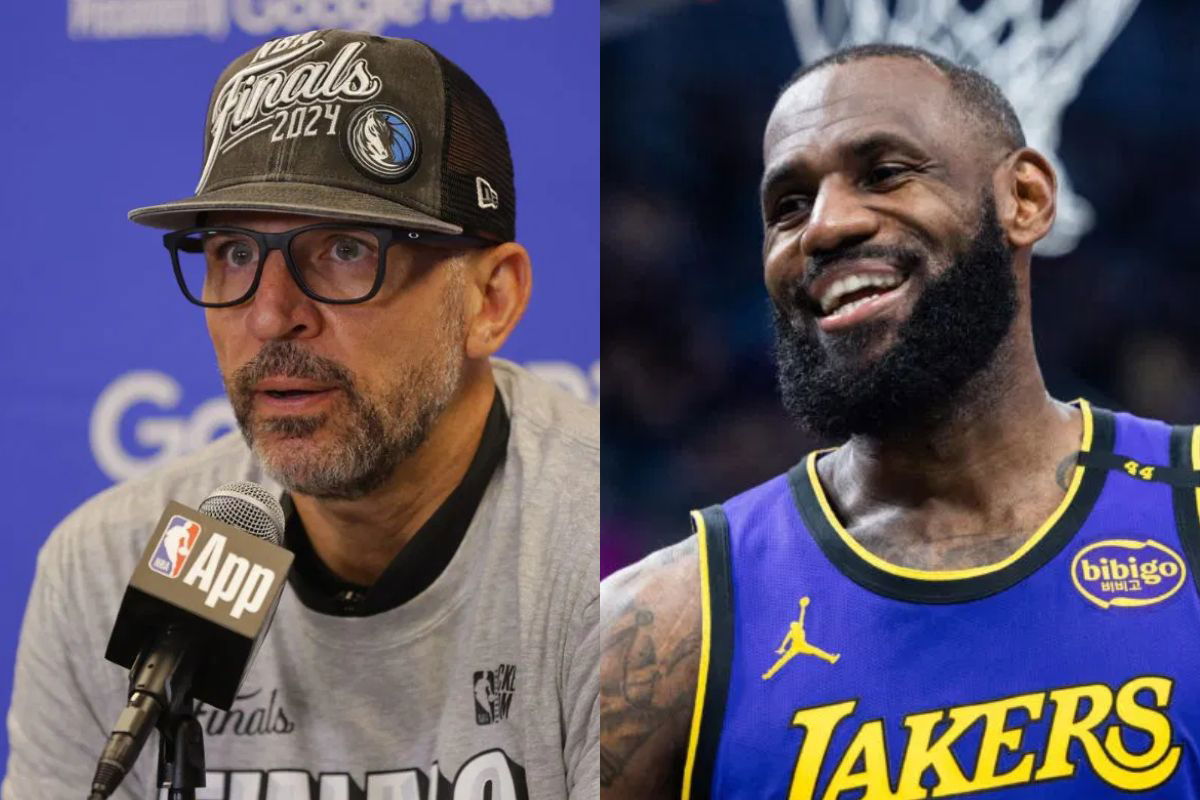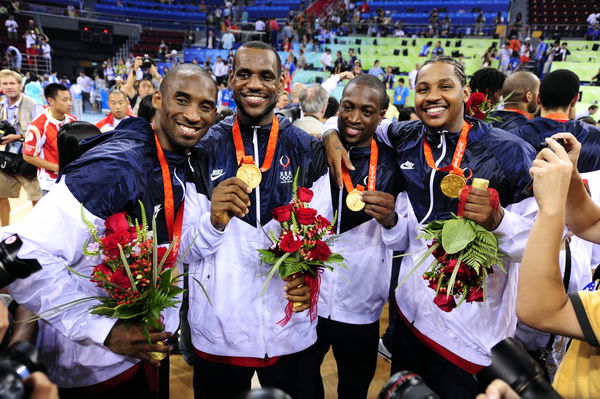
USA Today via Reuters
Image Credits: USA Today Network via IMAGN Images

USA Today via Reuters
Image Credits: USA Today Network via IMAGN Images
There are moments in sports where the past collides with the present in the most unexpected ways, funny, awkward, and revealing all at once. That’s exactly what happened when LeBron James and Jason Kidd reunited at the 2025 Naismith Memorial Basketball Hall of Fame induction ceremony. As members of the legendary 2008 Redeem Team, both men shared a bond forged through elite competition, Olympic glory, and a mission to restore USA Basketball’s dominance. But during a lighthearted conversation about their roles on that squad, LeBron James wasn’t about to let Jason Kidd take the spotlight with jokes at his expense.
Watch What’s Trending Now!
Together, they helped guide the Redeem Team to an undefeated 8-0 run, capping it with a gold medal win over Spain in a 118-107 triumph. Their efforts were instrumental in restoring confidence in Team USA’s global dominance, and the entire squad, including LeBron James and Jason Kidd, was inducted into the Hall of Fame in 2025.
ADVERTISEMENT
During a playful exchange at the ceremony, Kidd joked about his contribution to the team, saying: “I might have been the captain. I was more like the water boy, the towel boy. The clock, I kept the clock to make sure everybody was on time. No one was late. Asked everybody what Gatorade color they liked.” The crowd laughed until LeBron James cut him off. With a smirk, he interrupted: “Stop it. Stop it. Stop it.” The host laughed and asked, “So now we know who said that.”
LeBron wasn’t done. He added with playful sarcasm: “He’s the only one that’s never lost a game in international play ever. Ever. Ever. ” Kidd, never one to back down, shot back with another joke: “Do you see this group? I’m riding their coattails. “
ADVERTISEMENT
LeBron James receives his @Hoophall orange jacket as a member of the ‘Redeem Team’! 🔥 pic.twitter.com/V3f41IpRa3
— NBA (@NBA) September 6, 2025
The Redeem Team was formed to rebound from disappointing finishes at the 2004 Athens Olympics and 2006 FIBA World Championship. The mission was clear: bring back America’s basketball supremacy. Head coach Mike Krzyzewski and managing director Jerry Colangelo built a roster filled with star power, blending youthful athleticism with veteran leadership. Among them were Kobe Bryant, Dwyane Wade, Carmelo Anthony, Chris Paul, Dwight Howard, and, notably, LeBron James and Jason Kidd.
ADVERTISEMENT
LeBron James, at just 23 years old, was a rising force in the NBA. Already an All-Star and entering his fifth season with the Cleveland Cavaliers, he embraced a team-first role, averaging 15.5 points, 5.3 rebounds, and 3.8 assists per game in 25.6 minutes at the Olympics. He worked tirelessly, drawing from past international struggles to grow into a leader admired by teammates and coaches alike.
Jason Kidd, at 35, brought a wealth of experience. A two-time Olympic gold medalist by then, Kidd’s contribution was not in scoring but in guiding, mentoring, and instilling discipline. Averaging 1.6 points, 2.8 rebounds, and 2.0 assists in 13.5 minutes per game, Kidd’s presence was a calming force, the glue that kept the team’s chemistry intact.
ADVERTISEMENT
The banter was a masterclass in how deep friendships, competition, and mutual respect intersect. For LeBron James, it wasn’t just about defending his spot; it was about celebrating the team’s success with humor, sharp wit, and brotherhood.
ADVERTISEMENT
LeBron James’ Command, Jason Kidd’s Calm
The 2008 “Redeem Team” wasn’t just a collection of stars—it was a carefully balanced leadership experiment. Kobe Bryant supplied the competitive fire, but it was LeBron James and Jason Kidd who forged the team’s identity through contrasting styles of command.
Coach Mike Krzyzewski often highlighted LeBron’s intellect and presence, calling him the squad’s “vocal leader” in The Gold Standard. On the floor, James was more than a scorer: he organized the offense, communicated constantly, and earned the respect of peers who weren’t used to deferring. His transformation from the frustration of Athens in 2004 to the strategist and unifier of 2008 became the defining arc of the Redeem Team.
ADVERTISEMENT
Kidd, meanwhile, played the opposite role. At 35, the only man on the roster with a gold medal, he was the veteran anchor—steady, selfless, and deliberate. He averaged just one shot per game, willingly fading into the background so others could shine. Kidd’s leadership was quiet but invaluable: he steadied possessions, moved the ball, and connected a roster of young stars to the history of USA Basketball.

USA Today via Reuters
Aug 24, 2008; Beijing, CHINA; USA players Kobe Bryant (left), Lebron James (second left), Dwyane Wade (second right), and Carmelo Anthony pose with their gold medals following the mens basketball gold medal game against Spain at the Beijing Olympic Basketball Gymnasium during the 2008 Beijing Olympic Games. USA beat Spain 118-107 to win the gold medal. Mandatory Credit: Bob Donnan-USA TODAY Sports
What made this pairing so effective was their collaboration. LeBron, already an elite passer, looked to Kidd as the best in the game at that craft. In team meetings he sat beside him, and the two often stayed late to shoot, swapping “best practices.” That tutelage sharpened James’s playmaking—reflected in his 3.8 assists per game during the Olympics—and underscored how Kidd’s mentorship extended beyond the box score.
ADVERTISEMENT
Kidd himself remembered the team’s first practice as a crossroads. “Everyone’s kinda like watching who’s gonna do what, what’s LeBron going to do, what’s Kobe going to do,” he recalled. “And my job was to get those two to talk.” He also credited LeBron for breaking tension each morning with humor, doing playful introductions and impressions that eventually coaxed even Kobe into laughter. It was a subtle but vital leadership moment: the team began to relax, trust each other, and bond.
Together, their partnership bridged eras and personalities. James drove the team forward with energy and vision; Kidd grounded it with patience and perspective. That balance of youthful force and veteran restraint was the chemistry that turned the Redeem Team from a group of All-Stars into a gold-medal squad.
ADVERTISEMENT
ADVERTISEMENT
ADVERTISEMENT